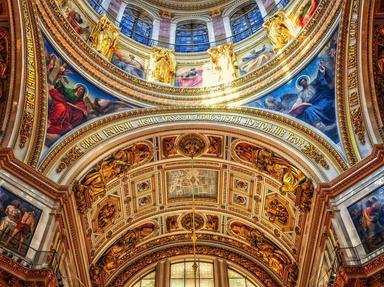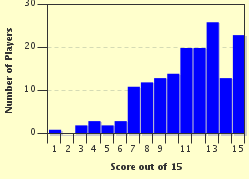Quiz Answer Key and Fun Facts
1. We read in the gospel of Matthew about a person disputing the word of Jesus.
Jesus had said, "All ye shall be offended because of me this night; for it is written, I will smite the Shepherd, and the sheep of the flock shall be scattered abroad."-- Matthew 26:31.
"
This person responded with, "Though all men shall be offended because of thee, yet will I never be offended."
WHO said these words to Jesus?
2. Christians believe that Jesus is the son of God, yet most of them also call Him by another name as well.
WHAT else is He referred to as?
3. In Luke 15, a parable or story is told of a son who squanders his inheritance. Many people will recognize this as the parable of 'The Prodigal Son'. This young man had an older brother who had stayed at home while he went out living what today might be referred to as "the good life" with his so-called friends until he was left alone and penniless.
WHY did the older brother resent his younger sibling returning home?
4. In the gospel accounts we see that people encountered Jesus AFTER his resurrection. Two in particular bear close scrutiny.
Mary, who met Jesus at the tomb the morning after His resurrection, was denied permission to touch Jesus; yet a while later one of Jesus' disciples was given permission to do so.
WHO was this disciple?
5. It was necessary for the Roman authorities to have Jesus crucified or put to death.
WHY could the Jews themselves not have taken such action unilaterally without Rome's approval?
6. At Jesus' baptism as related in Matthew 3:11-17, at the moment that Jesus came up out of the water of the Jordan river, the Spirit of God, or the Holy Ghost descended like a bird and lit upon him. (verse 16).
WHAT type of bird is the Holy Ghost likened to in this passage?
7. In John 6:26-35, we read of the miracle of five thousand people being fed. This miracle shows Jesus at the pinnacle of His popularity, yet soon the people began to question and complain about what He meant when He explained to them that He himself was the "bread of life." They misunderstood Jesus' underlying meaning and seemingly took Him literally.
In Christian teaching, WHY did Jesus refer to himself in this way?
8. Jesus once went into a land called the country of the Gadarenes, where He cast many demons that were in a man into a herd of swine, who promptly threw themselves off a steep place into the sea.
When Jesus initially approached the man, the man asked Jesus a question, but
WHY did the man refer to Him as, "...Jesus, thou Son of the most high God"?
9. In Luke 16:19-31 there is a story about a rich man and a beggar. When the rich man died, he lifted up his eyes and made inquiry to Abraham, who was far away. His request to Abraham was denied because Abraham answered that the beggar could not be sent back from the dead to warn the family of the rich man to repent.
WHAT was the name of the beggar that the rich man wanted to send to warn his family?
10. In Matthew 13:1-12, the disciples asked Jesus why He spoke to the multitudes in parables (stories). Jesus answered them in a way that might have confused them more.
WHY did He say He told parables to the crowds that gathered?
11. King Herod was not a very nice man. Perhaps this is a bit of an understatement. He had what we might call today some serious "issues". He even had John the Baptist imprisoned for an offence that we today might consider peculiar.
WHY had Herod put John in prison?
12. After the resurrection of Jesus, he met with most of his disciples (with the exception of Thomas), after entering a room with closed doors. I don't know if He walked through the walls or what, but the Bible simply says that he appeared among them.
He then spoke for a moment, showing them the scars in His hands and side and then... He breathed on them and said something else.
WHAT did He then say, according to John 20:22?
13. Jesus was anointed on two different occasions in the week before His death. In Luke 7:36-38, we see that a woman anointed His feet, six days before the Passover feast. A few days later, another woman anointed Him by breaking open a box of ointment and pouring it on Jesus' head.
WHY were these anointings so important, according to Jewish cultural norms of that day?
14. The religious leaders of Jesus' day -- the Pharisees, the Sadducees, the scribes and others -- were often at odds with Jesus. They felt that He was a rabble-rouser, a threat to their national security, and that He had ignored their religious laws far too often. In Luke 15:1-10, there is yet another instance mentioned where they were having "problems" with Him.
WHY were they upset with Him on this occasion?
15. In Matthew 17:1-8, there is perhaps a familiar account of Moses and Elijah appearing, talking with Jesus. Peter, James and John were eye-witnesses to this event, and Peter quickly suggested to Jesus that they build tabernacles for all three of them on the spot. A voice interrupted him from a bright cloud and said, "This is my beloved Son, in whom I am well pleased; hear ye him."
WHERE were they when this happened?
Source: Author
logcrawler
This quiz was reviewed by FunTrivia editor
CellarDoor before going online.
Any errors found in FunTrivia content are routinely corrected through our feedback system.


